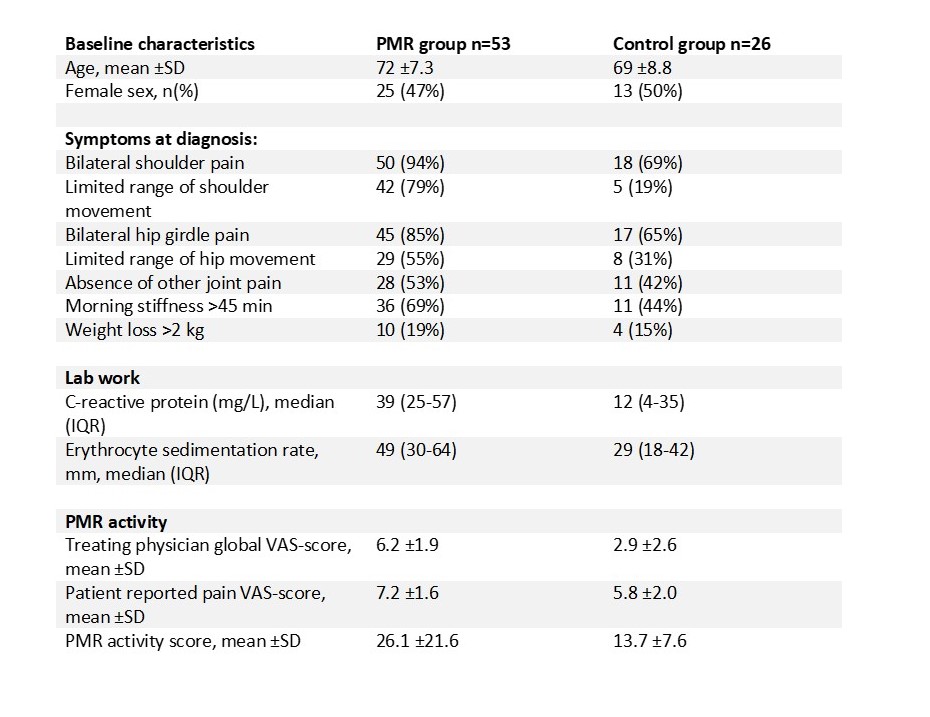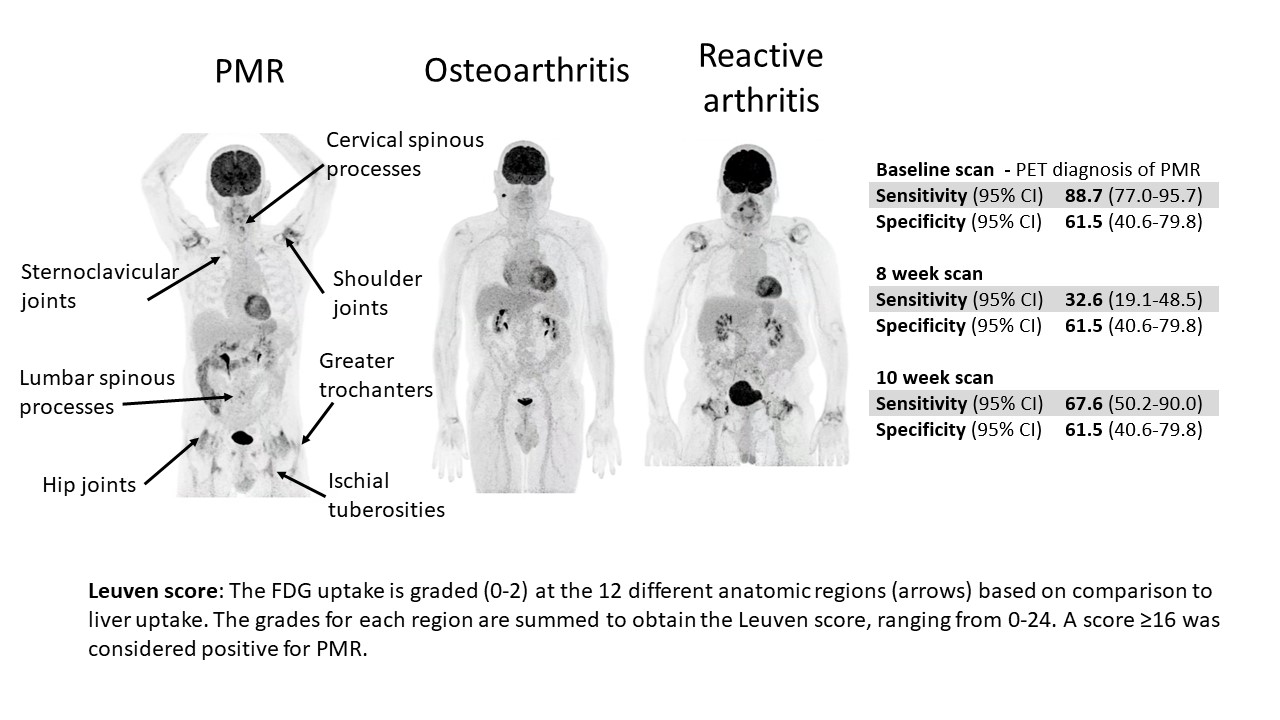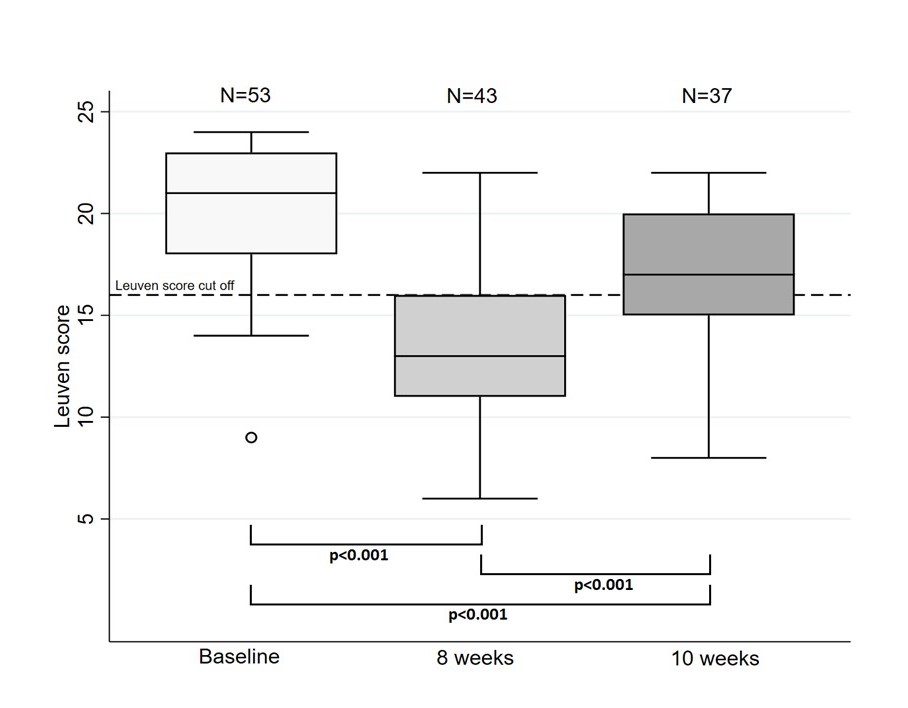Session Information
Session Type: Poster Session C
Session Time: 9:00AM-11:00AM
Background/Purpose: Polymyalgia rheumatica (PMR) can be challenging to diagnose since other diseases may present with similar symptoms. As a result, a significant number of patients are referred to rheumatologists for a second opinion. However, a notable proportion of patients are administered prednisolone prior to rheumatologic assessment, which can obscure the symptoms of PMR and important differential diagnoses. 18F-fluorodeoxyglucose(FDG) positron emission tomography and computed tomography (PET/CT) has been suggested as a potential tool to aid the clinician diagnosing PMR, but it is unclear whether PET/CT can be used after the initiation of prednisolone. This study aimed to investigate the diagnostic utility of FDG-PET/CT in patients suspected of PMR, specifically evaluating the diagnostic accuracy before, during, and after a short-term taper of prednisolone.
Methods: This study included 101 patients who were suspected of having PMR. All patients were clinically diagnosed with PMR or non-PMRat a baseline visit and subsequently had a PET/CT performed. Patients diagnosed with PMR were administered prednisolone with a starting dose of 15 mg following the first PET/CT. After 8 weeks of treatment a second PET/CT was performed when prednisolone had been tapered to 10 mg, according to an algorithm reflecting routine care. Afterwards, prednisolone was tapered with complete cessation at week 9 followed by a third PET/CT at week 10. A PET/CT assessment of PMR or non-PMR was given utilizing the validated Leuven score (Figure 1) [1]. The final diagnosis for all patients was confirmed at a 1-year follow-up visit.
Results: Preliminary results of the first 79 patients have been obtained, and the baseline characteristics of the PMR and non-PMR group are outlined in table 1. A baseline PET/CT diagnosis showed a sensitivity of 88.7% and a specificity of 61.5% using a clinical diagnosis at 1 year as the reference standard (Figure 1). The low specificity was partially explained by a high rate of false positive patients with a final diagnosis of other inflammatory diseases, since 8 out of 10 non-PMR patients with a final diagnosis of rheumatoid arthritis or reactive diseases had a PET/CT indicating PMR according to the Leuven score. After 8 weeks of prednisolone treatment the Leuven score decreased significantly, but in 14/46 patients the PET/CT diagnosis remained positive for PMR (Figure 2). After prednisolone cessation the Leuven score increased significantly, with a positive PET/CT diagnosis of PMR in 25/37.
Conclusion: Initiation of prednisolone treatment prior to PET/CT significantly reduces the diagnostic accuracy for a PMR diagnosis. Therefore, a short-term prednisolone taper is advisable before using PET/CT to diagnose PMR in patients treated with a medium dosage of prednisolone. Furthermore, PET/CT utilizing the Leuven score may not be reliable for differentiating PMR from other inflammatory disorders during the initial evaluation.
References [1] Henckaerts L, Gheysens O, Vanderschueren S, Goffin K, Blockmans D. Use of 18F-fluorodeoxyglucose positron emission tomography in the diagnosis of polymyalgia rheumatica-A prospective study of 99 patients. Rheumatology (Oxford) 2018;57(11):1908-16.
To cite this abstract in AMA style:
Nielsen A, Hansen I, Dalsgaard Nielsen B, Kjær S, Blegvad-Nissen J, Sørensen C, Hauge E, Gormsen L, Keller K. FDG-PET/CT for Diagnosing Polymyalgia Rheumatica Before, During and After a Short-term Prednisolone Cessation – a Prospective Study of 101 Patients [abstract]. Arthritis Rheumatol. 2023; 75 (suppl 9). https://acrabstracts.org/abstract/fdg-pet-ct-for-diagnosing-polymyalgia-rheumatica-before-during-and-after-a-short-term-prednisolone-cessation-a-prospective-study-of-101-patients/. Accessed .« Back to ACR Convergence 2023
ACR Meeting Abstracts - https://acrabstracts.org/abstract/fdg-pet-ct-for-diagnosing-polymyalgia-rheumatica-before-during-and-after-a-short-term-prednisolone-cessation-a-prospective-study-of-101-patients/



